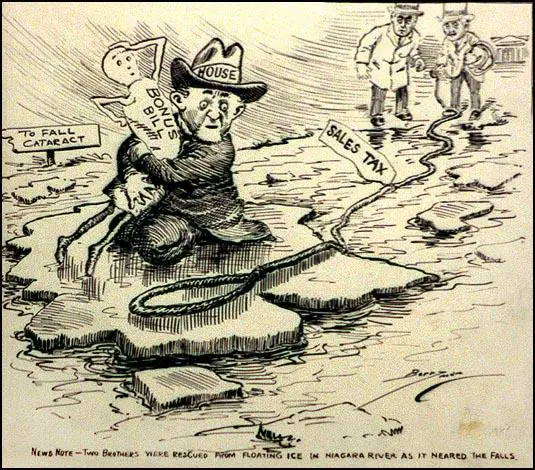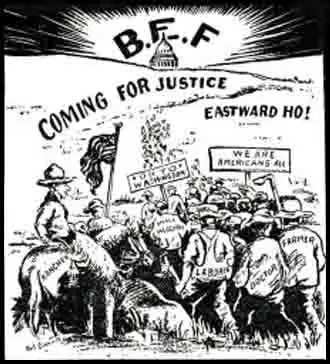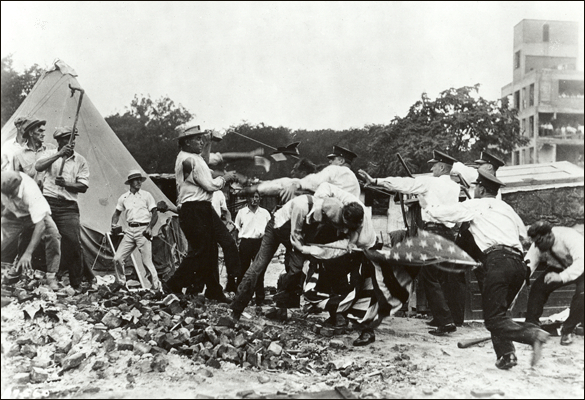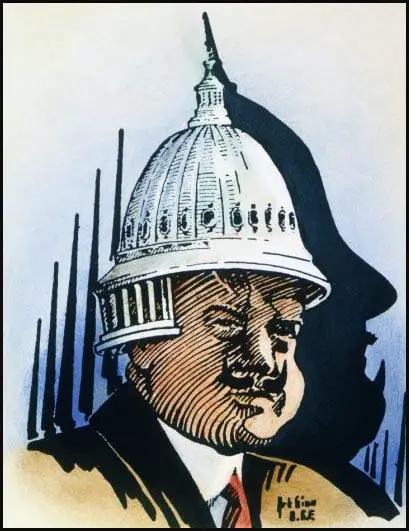Bonus Army
In May 1924 Congress voted $3,500,000,000 to the American veterans of the First World War. President Calvin Coolidge vetoed the bill saying: "patriotism... bought and paid for is not patriotism." However, Congress overrode his veto a few days later, enacting the World War Adjusted Compensation Act. Each veteran was to receive a dollar for each day of domestic service, up to a maximum of $500, and $1.25 for each day of overseas service, up to a maximum of $625. (1)
In order to prevent an immediate strain on its funds, the Government decided to pay the money over a 20 year period. During the Great Depression, many of these veterans found it difficult to find work. An increasing number came to the conclusion that the money would be more useful to them in this time of need than when the bonus was due. As Jim Sheridan pointed out: "The soldiers were walking the streets, the fellas who had fought for democracy in Germany. They thought they should get the bonus right then and there because they needed the money." (2)
1932 Veteran's Bonus Bill
In 1932 John Patman of Texas, introduced the Veteran's Bonus Bill which mandated the immediate cash payment of the endowment promised to the men who fought in the war. Although there was congressional support for the immediate redemption of the military service certificates, President Herbert Hoover opposed such action claiming that the government would have to increase taxes to cover the costs of the payout. (3)

In a letter to Reed Smoot, the senator from Utah, Hoover explained: "The proposal is to authorize loans upon these certificates up to 50% of their face value. As the face value is about $3,423,000,000, loans at 50% thus create a potential liability for the Government of about $1,172,000,000, and, less the loans made under the original Act, the total cash which might be required to be raised by the Treasury is about $1,280,000,000 if all should apply. The Administrator of Veterans' Affairs informs me by the attached letter that he estimates that if present conditions continue, then 75% of the veterans may be expected to claim the loans, or a sum of approximately $1,000,000,000 will need to be raised by the Treasury." (4)
Bonus Army at Anacostia Flats
In May 1932, 10,000 of these ex-soldiers marched on Washington in an attempt to persuade Congress to pass the Patman Bill. When they arrived in the capital the Bonus Marchers camped at Anacostia Flats, an area that had formerly been used as an army recruiting centre. They built temporary homes on the site and threatened to stay there until they received payment of money granted to them by Congress. It was clear that the veteran camp was a source of great embarrassment to Hoover and provided further proof of the government's callous unconcern for the plight of the people." (5)

John Dos Passos interviewed some of the men and reported on the issue for the The New Republic: "They... needed their bonus now; 1945 would be too late, only buy wreaths for their tombstones. They figured out, too, that the bonus paid now would tend to liven up business, particularly the retail business in small towns; might be just enough to tide them over till things picked up." Unable to afford the travel costs they hitchhiked and rode free on freight trains so they could go to Washington. (6)
Malcolm Cowley pointed out: "They arrived by hundreds or thousands every day in June. Ten thousand were camped on marshy ground across the Anacostia River, and ten thousand others occupied a number of half-demolished buildings between the Capitol and the White House. They organized themselves by states and companies and chose a commander named Walter W. Waters, an ex-sergeant from Portland. Oregon, who promptly acquired an aide-de-camp and a pair of highly polished leather puttees. Meanwhile the veterans were listening to speakers of all political complexions, as the Russian soldiers had done in 1917. Many radicals and some conservatives thought that the Bonus Army was creating a revolutionary situation of an almost classical type." (7)
It is estimated that by June 1932, there were 20,000 men living in the camp. President Herbert Hoover refused to meet with the leaders of the Bonus Army and ordered the gates of the White House chained shut. Police Chief Pelham Glassford did his utmost to provide tents and bedding for the veterans, furnished medicine, and assisted with food and sanitation. "The men were camped illegally, but Glasford (who had been the youngest brigadier general with the AEF in France) choose to treat them simply as old soldiers who had fallen on old times who had fallen on hard times. He resisted efforts to use force to dislodge them." (8)
On 15th June the House of Representatives passed the Bonus Bill by 209-176. Two days later the Senate defeated it 62-18. The veterans were now ordered to leave the city. According to the authorities some 5,000 people did leave the camp. Hoover claimed that "an examination of a large number of names discloses the fact that a considerable part of those remaining are not veterans; many are communists and persons with criminal records." (9)
Destruction of Bonus Army Camp
The vast majority of the people in the camp refused to move. Secretary of War, Patrick J. Hurley, told Hoover that the country faced the possibility of a Communist uprising of vast proportions and talked about the need to impose martial law. The District of Columbia commissioners, on the suggestion of President Hoover, ordered Glassford to clear the area where the veterans were squatting. More controversially, he also instructed the armed forces to become involved in this action. (10)
On 28th July, General Douglas MacArthur and assisted by Major George S. Patton, used soldiers from the 3rd Cavalry Regiment and the 16th Infantry, supported by tanks and machine guns, to clear the area. After a tear gas barrage the cavalry swept the camp, followed by infantrymen, who systematically set fire to the veterans' tents and temporary buildings to stop the men returning. MacArthur, controversially used tanks, four troops of cavalry with drawn sabers, and infantry with fixed bayonets, on the ex-serviceman. He justified his attack by claiming the "mob" was animated by the "essence of revolution". (11)

During the operation two of the men, William Hushka and Eric Carlson, were killed. Time Magazine reported that: "When war came in 1917 William Hushka, 22-year-old Lithuanian, sold his St. Louis butcher shop, gave the proceeds to his wife, joined the Army. He was sent to Camp Funston, Kansas where he was naturalized. Honorably discharged in 1919, he drifted to Chicago, worked as a butcher, seemed unable to hold a steady job. His wife divorced him, kept his small daughter. Long jobless, in June he joined a band of veterans marching to Washington to fuse with the Bonus Expeditionary Force. 'I might as well starve there as here', he told his brother. He took part in the demonstration at the Capital the day Congress adjourned without voting immediate cashing of the bonus. Last week William Hushka's Bonus for $528 suddenly became payable in full when a police bullet drilled him dead in the worst public disorder the capital has known in years." (12)
President Herbert Hoover released a statement explaining his actions: "For some days police authorities and Treasury officials have been endeavoring to persuade the so-called bonus marchers to evacuate certain buildings which they were occupying without permission... This morning the occupants of these buildings were notified to evacuate and at the request of the police did evacuate the buildings concerned. Thereafter, however, several thousand men from different camps marched in and attacked the police with brickbats and otherwise injured several policemen, one probably fatally... An examination of a large number of names discloses the fact that a considerable part of those remaining are not veterans; many are communists and persons with criminal records." (13)
Some newspapers praised President Hoover for acting decisively, however, most were highly critical of what he had done. The The New York Times, devoted its first three pages to the coverage, including a full page of photographs showing the veterans being attacked. The Washington Daily News stated: "The mightiest government in the world chasing unarmed men, women and children with Army tanks. If the Army must be called out to make war on unarmed citizens, this is no longer America. (14)
Franklin D. Roosevelt and the Bonus Army
Franklin D. Roosevelt, the Democratic presidential candidate told Rexford Tugwell: "What Hoover should have done was to meet with the leaders of the Bonus Army when they asked for an interview. When two hundred or so marched up to to the White House, Hoover should have sent out coffee and sandwiches and asked a delegation in. Instead, he let Pat Hurley and Doug MacArthur do their thing... MacArthur has just prevented Hoover's re-election." (15)
Eleanor Roosevelt later wrote: "I shall never forget my feeling of horror when I learned that the Army had actually been ordered to evict the veterans from their encampment... This one incident shows what fear can make people do, for Mr. Hoover was a Quaker, who abhorred violence, and General MacArthur, the chief of staff, must have known how many veterans would resent the order and never forget it. They must have known, too, the effect it would have on public opinion." (16)

In May, 1933, the Bonus Marchers descended on Washington for another attempt to secure early payment of their insurance policies. President Roosevelt reacted very differently from Hoover. He arranged for them to stay at Fort Hunt. Tents, latrines, showers, mess halls, and a large convention tent were ready and waiting when the veterans arrived. "The Army provided a never-ending supply of coffee and three hot meals a day; the Medical Corps treated their ills; service dentists fixed their teeth; and the Navy Band played daily concerts." (17)
Eleanor Roosevelt and Louis Howe drove to Fort Hall. She later recalled how she spent more than a hour at the camp inspected the facilities and living quarters: "I got out and walked over to where I saw a line-up of men waiting for food. They looked at me curiously and one of them asked my name and what I wanted. When I said I just wanted to see how they were getting on, they asked me to join them. After their bowls were filled with food, I followed them into the big eating hall. I was invited to say a few words to them." (18) One of the men said: "Hoover sent the Army, Roosevelt sent his wife." (19)
After negotiations President Roosevelt agreed to change the rules about the age that the men could receive their payments (most of the veterans were in their forties). The younger men were offered places in the recently formed Civilian Conservation Corps (CCC). After the Bonus Army voted to disband the remaining four hundred or so were given free rail transportation home. He also pleased the men with the passing of the Public Works Administration (PWA) with its 3.3 billion dollar public works programme. (20)
John Patman continued with his campaign to persuade the government to pay out the war bonus to the rest of the veterans still alive. This time he gained the support of important populist political figures such as Huey P. Long and Father Charles Coughlin, the Adjusted Compensation Payment Act, authorizing the immediate payment of the $2 billion in First World War bonuses was passed by Congress in January, 1936. (21)
Primary Sources
(1) Herbert Hoover, letter to Reed Smoot (18th February, 1931)
I have given thought to your request that I should express to you and the Senate Finance Committee my views upon the bill passed by the House of Representatives, increasing the loans to World War veterans upon the so-called bonus certificates. In view of the short time remaining in this session for its consideration I shall comply with your request.
The proposal is to authorize loans upon these certificates up to 50% of their face value. And to avoid confusion it must be understood that the “face value” is the sum payable at the end of the 20 years period (1945) being based on the additional compensation to veterans of about $1,300,000,000 granted about six years ago, plus 25% for deferment, plus 4% compound interest for the 20 year period. As the “face value” is about $3,423,000,000, loans at 50% thus create a potential liability for the Government of about $1,172,000,000, and, less the loans made under the original Act, the total cash which might be required to be raised by the Treasury is about $1,280,000,000 if all should apply. The Administrator of Veterans' Affairs informs me by the attached letter that he estimates that if present conditions continue, then 75% of the veterans may be expected to claim the loans, or a sum of approximately $1,000,000,000 will need to be raised by the Treasury.
I will not undertake to enumerate all of the grounds for objection to this proposal. There are a number of most serious objections, some of which are matters of method and some of which are matters of fundamental principle affecting the future of our country and the service men themselves.
I have supported, and the nation should maintain, the important principle that when men have been called into jeopardy of their very lives in protection of the Nation, then the Nation as a whole incurs a special obligation beyond that to any other groups of its citizens. These obligations cannot be wholly met with dollars and cents. But good faith and gratitude require that protection be given to them when in ill health, distress and in need. Over 700,000 World War Veterans or their dependents are today receiving monthly allowances for these reasons. The country should not be called upon, however, either directly or indirectly, to support or make loans to those who can by their own efforts support themselves.
By far the largest part of the huge sum proposed in this bill is to be available to those who are not in distress.
The acute depression and unemployment create a situation of unusual economic sensitiveness, much more easily disturbed at this time than in normal times by the consequences of this legislation, and such action may quite well result in a prolongation of this period of unemployment and suffering in which veterans will themselves suffer with others.
By our expansion of public construction for assistance to unemployment and other relief measures, we have imposed upon ourselves a deficit in this fiscal year of upwards of $500,000,000 which must be obtained by issue of securities to the investing public. This bill may possibly require the securing of a further billion of money likewise from the public. Beyond this, the Government is faced with a billion dollars of early maturities of outstanding debts which must be refunded aside from constant renewals of a very large amount of temporary Treasury obligations. The additional burdens of this project cannot but have damaging effect at a time when all effort should be for the rehabilitation of employment through resumption of commerce and industry.
There seems to be a misunderstanding in the proposal that the Government securities already lodged with the Treasury to the amount of over $700,000,000 as reserve against these certificates constitute available cash to meet this potential liability. The cash required by the veterans can only be secured by the sale of these securities to the public. The legislation is defective in that this $700,000,000 of Government securities is wholly inadequate to mend either a potential liability of $1,280,000,000 or approximately $1,000,000,000 estimated as possible by the Administrator of Veterans' Affairs, and provision would need to be made at once for this deficiency.
The one appealing argument for this legislation is for veterans in distress. The welfare of the veterans as a class is inseparable from that of the country. Placing a strain on the savings needed for rehabilitation of employment by a measure which calls upon the Government for a vast sum beyond the call of distress, and so adversely affecting our general situation, will in my view not only nullify the benefits to the veteran but inflict injury to the country as a whole.
(2) Herbert Hoover, statement (28th July, 1932)
For some days police authorities and Treasury officials have been endeavoring to persuade the so-called bonus marchers to evacuate certain buildings which they were occupying without permission. These buildings are on sites where Government construction is in progress and their demolition was necessary in order to extend employment in the District to carry forward the Government's construction program.
This morning the occupants of these buildings were notified to evacuate and at the request of the police did evacuate the buildings concerned. Thereafter, however, several thousand men from different camps marched in and attacked the police with brickbats and otherwise injured several policemen, one probably fatally.
I have received the attached letter from the Commissioners of the District of Columbia stating that they can no longer preserve law and order in the District.
In order to put an end to this rioting and defiance of civil authority, I have asked the Army to assist the District authorities to restore order.
Congress made provision for the return home of the so-called bonus marchers who have for many weeks been given every opportunity of free assembly, free speech and free petition to the Congress. Some 5,000 took advantage of this arrangement and have returned to their homes. An examination of a large number of names discloses the fact that a considerable part of those remaining are not veterans; many are communists and persons with criminal records.
The veterans amongst these numbers are no doubt aware of the character of their companions and are being led into violence which no government can tolerate.
(3) John Dos Passos, The New Republic (29th June, 1932)
A bunch of out-of-work ex-service men in Portland, Oregon, figured they needed their bonus now; 1945 would be too late, only buy wreaths for their tombstones. They figured out, too, that the bonus paid now would tend to liven up business, particularly the retail business in small towns; might be just enough to tide them over till things picked up. So three hundred of them started east in old cars and trucks, hitchhiking, riding on freight trains.
By the time they reached Council Buffs (Iowa) they found other groups all over the country were rebelling against their veterans' organizations and getting the same idea. It was an Army. They organized it as such and nicknamed it the Bonus Expedition Force.
(4) Time Magazine (8th August, 1932)
When war came in 1917 William Hushka, 22-year-old Lithuanian, sold his St. Louis butcher shop, gave the proceeds to his wife, joined the Army. He was sent to Camp Funston, Kansas where he was naturalized. Honorably discharged in 1919, he drifted to Chicago, worked as a butcher, seemed unable to hold a steady job. His wife divorced him, kept his small daughter.
Long jobless, in June he joined a band of veterans marching to Washington to fuse with the Bonus Expeditionary Force. "I might as well starve there as here", he told his brother. He took part in the demonstration at the Capital the day Congress adjourned without voting immediate cashing of the bonus.
Last week William Hushka's Bonus for $528 suddenly became payable in full when a police bullet drilled him dead in the worst public disorder the capital has known in years.
(5) Malcolm Cowley, The New Republic (17th August, 1932)
A few weeks later there was more talk of revolution when the Bonus Expeditionary Force descended on Washington. The BEF was a tattered army consisting of veterans from every state in the Union; most of them were old-stock Americans from smaller industrial cities where relief had broken down. All unemployed in 1932, all living on the edge of hunger, they remembered that the government had made them a promise for the future. It was embodied in a law that Congress had passed some years before, providing "adjusted compensation certificates" for those who had served in the Great War; the certificates were to be redeemed in dollars, but not until 1945. Now the veterans were hitchhiking and stealing rides on freight cars to Washington, for the sole purpose, they declared, of petitioning Congress for immediate payment of the soldiers' bonus. They arrived by hundreds or thousands every day in June. Ten thousand were camped on marshy ground across the Anacostia River, and ten thousand others occupied a number of half-demolished buildings between the Capitol and the White House. They organized themselves by states and companies and chose a commander named Walter W. Waters, an ex-sergeant from Portland. Oregon, who promptly acquired an aide-de-camp and a pair of highly polished leather puttees. Meanwhile the veterans were listening to speakers of all political complexions, as the Russian soldiers had done in 1917. Many radicals and some conservatives thought that the Bonus Army was creating a revolutionary situation of an almost classical type.
(6) Herbert Hoover, statement (29th July, 1932)
A challenge to the authority of the United States Government has been met, swiftly and firmly.
After months of patient indulgence, the Government met overt lawlessness as it always must be met if the cherished processes of self-government are to be preserved. We cannot tolerate the abuse of Constitutional rights by those who would destroy all government, no matter who they may be. Government cannot be coerced by mob rule.
The Department of Justice is pressing its investigation into the violence which forced the call for Army detachments, and it is my sincere hope that those agitators who inspired yesterday's attack upon the Federal authority may be brought speedily to trial in the civil courts. There can be no safe harbor in the United States of America for violence.
Order and civil tranquility are the first requisites in the great task of economic reconstruction to which our whole people now are devoting their heroic and noble energies. This national effort must not be retarded in even the slightest degree by organized lawlessness. The first obligation of my office is to uphold and defend the Constitution and the authority of the law. This I propose always to do.
Student Activities
Economic Prosperity in the United States: 1919-1929 (Answer Commentary)
Women in the United States in the 1920s (Answer Commentary)
Volstead Act and Prohibition (Answer Commentary)
The Ku Klux Klan (Answer Commentary)
Classroom Activities by Subject

